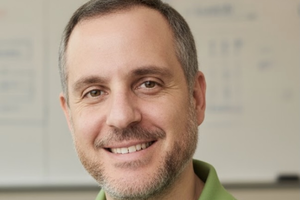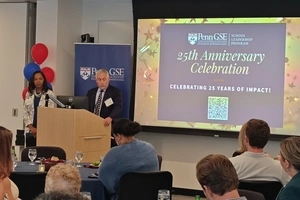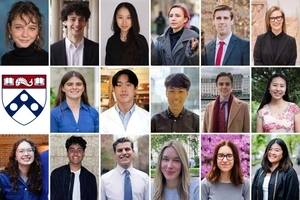Editor’s note: Following Penn’s transition to virtual classes in March due to the COVID-19 crisis, both students featured here left campus and continued their studies and graduate assistantships virtually.
A young man beginning a new life in the United States as a freshman at Penn felt overwhelmed and out of place. The international, first-generation college student wasn’t sure where to turn for help navigating an unfamiliar environment. Then, he found Rachel O’Connell and her colleagues at PENNCAP (University of Pennsylvania College Achievement Program), which provides academic and personal support programs and services for a diverse group of undergraduates, most of whom identify as first generation, low income, or both.
“Our staff is small, and we take a genuine interest in what students say and develop a deep sense of community,” says O’Connell, a higher education master’s student who began working with PENNCAP through Penn GSE’s Graduate Assistantship program. “For this student, the PENNCAP community made the difference in deciding to continue at Penn.”
For O’Connell and fellow Penn GSE master’s students, the practical experience afforded by the Graduate Assistantship (GA) program complements their coursework and represents an important part of their career preparation. Each year students take on an array of paid, part-time GA positions at GSE, Penn, and other institutions and organizations in the Philadelphia area. Previously such positions were available only to students in the higher education master’s program, but now all M.S.Ed. students at Penn GSE may apply for them.
“These positions might be a student’s first work experience in higher education and are often their first professional experience ever,” says Higher Education Division Program Manager Ross Aikins, who oversees the GA program. “They allow students to build their résumés at the same time that they’re gaining a valuable understanding of university culture.”
"These positions might be a student’s first work experience in higher education and are often their first professional experience ever. They allow students to build their résumés at the same time that they’re gaining a valuable understanding of university culture.”
A Place to Call Home
O’Connell is well equipped to support first-generation and international students because she can relate to them. A first-generation student herself, she moved to New York from Pakistan at the age of seventeen and can imagine how she might have benefited from programming like PENNCAP’s while she pursued her bachelor’s degree.
“We want to make sure under-represented students have all their needs met and feel PENNCAP is a place they can call home,” she says. “The students we work with are fearless in taking up space and asking questions. In my own experience being first generation, I was afraid to do that.”
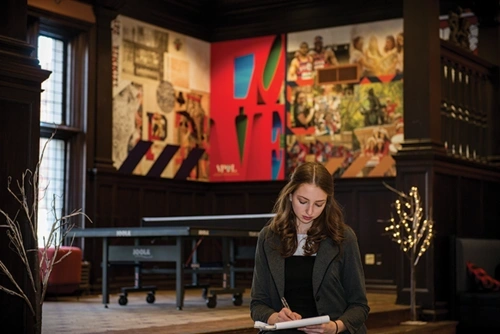
As coordinator of PENNCAP’s Graduate School Mentoring Initiative, O’Connell assists undergraduate students aiming to apply to graduate school. Playing “academic matchmaker,” she pairs each undergraduate with a graduate student in their desired field who serves as a mentor throughout the year. She also hosts workshops on subjects ranging from financial aid to personal statements. Her assistantship also helps her develop her interest in international programming, since she is involved in the selection and budgeting processes for PENNCAP’s International Initiative, which funds research, internships, and service opportunities abroad.
“This position has given me space to grow, because I essentially run two programs, while checking in with colleagues when I need to,” says O’Connell. “It’s been an incredible opportunity to expand my skill set.” She also gained practical experience with staffing transitions when her original supervisor moved on from PENNCAP and a new supervisor was brought on board.
“Whenever you have any kind of reorganization in any department, you need capable staff to step up, which Rachel did immediately,” says Dr. Aikins. “PENNCAP is an important organization that serves an important population, and both PENNCAP and I were glad it was Rachel in that position.”
After she graduates this spring, O’Connell intends to pursue a doctoral degree, although she is still narrowing down her career options—some of which she began exploring only recently. She has long felt compelled to work on issues of diversity and inclusion, but both her role at PENNCAP and her coursework have introduced her to the possibilities of a job in policy, research, or data analysis. Assistant Professor Amalia Dache’s Diversity in Higher Education class was particularly influential.
“As an undergraduate literature major, I loved talking about theory and identity politics, and I thought I would have to give that up in my master’s program,” she says. “But Professor Dache used both theory and data to talk about college access, which showed me that I can marry my conceptual, theoretical interests with a different professional route.”
Through an Equity Lens
The youngest of four siblings whose parents emigrated from Mexico to Oregon, higher education M.S.Ed. student Gabriel Gutiérrez-Aragón also keeps diversity and equity at top of mind.
“I chose this field because education represented social mobility for me and my family,” says Gutiérrez-Aragón. “My mom and dad started working at a young age and were not able to study beyond fourth or fifth grade, and I am the only one of my siblings who completed a bachelor’s degree. To be in a master’s program now—that’s a big leap.”
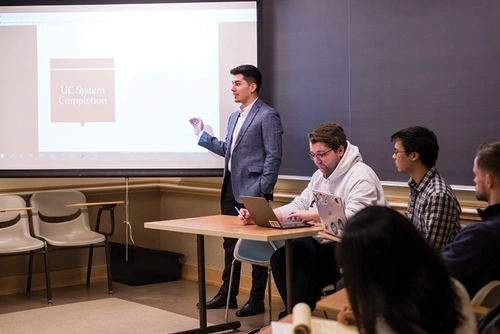
Gutiérrez-Aragón attended a private urban high school that is part of the Cristo Rey network created for teenagers from low-income families. There, students attended class four days a week and worked on the fifth to offset tuition costs. Recognizing that not all young people have access to similar resources, Gutiérrez-Aragón aims to have an impact on educational inequality. This focus made him an ideal fit for his graduate assistantship with Research for Action (RFA), a Philadelphia-based nonprofit research organization working to improve educational opportunities for underserved populations.
“I came to Penn thinking I wanted to be a professor, because I only ever envisioned doing research inside of a university. Then I got paired with this GA position and started to consider what it looks like to do research outside of academia in order to impact the issues I care about,” he says.
RFA partners with various organizations and government agencies to study educational programs, services, and policies and their effects on students. For example, Gutiérrez-Aragón has examined how “wraparound services”—nonacademic support services delivered in schools to students and families—affect college enrollment and graduation rates. He has also explored features and outcomes of different state college promise programs, which guarantee college funding for students meeting certain criteria.
“We have an equity lens and support underserved students by providing a complete picture of what’s happening with these programs and how they are impacting target populations,” says Gutiérrez-Aragón, who will graduate in December and subsequently plans to pursue a Ph.D. in education policy.
Says Aikins, “Since I first talked to Gabriel back when he was a prospective student, he made it clear that he had research ambitions and wanted to go into a doctoral program. Having a research-focused position at RFA is perfect for him because he has the opportunity to work with real data, which will position him well.”
This summer, Gutiérrez-Aragón hopes to obtain an educational research internship. He credits his RFA supervisors—Daniel Kent, GED’16, and Shanell Hagood, GED’18, both Penn GSE higher education M.S.Ed. program graduates—with supporting his search for positions. And although he has opened his eyes to potential new career paths, he hasn’t ruled out the possibility of becoming a professor. Seeing diversity among Penn GSE’s faculty members inspires him; he cites Associate Professor Manuel González Canché as a strong role model.
“He has been so instrumental in shaping my experience, giving me opportunities to work with him on his research and to jump on research projects with Ph.D. students. I’m learning a lot of quantitative research skills, which I had none of before coming to Penn.
I never imagined I would be doing any sort of coding or statistics—but I figure if I’ve made it this far, I should really challenge myself,” he says.
This article appeared in the Spring 2020 issue of The Penn GSE Magazine.
Media Inquiries
Penn GSE Communications is here to help reporters connect with the education experts they need.

